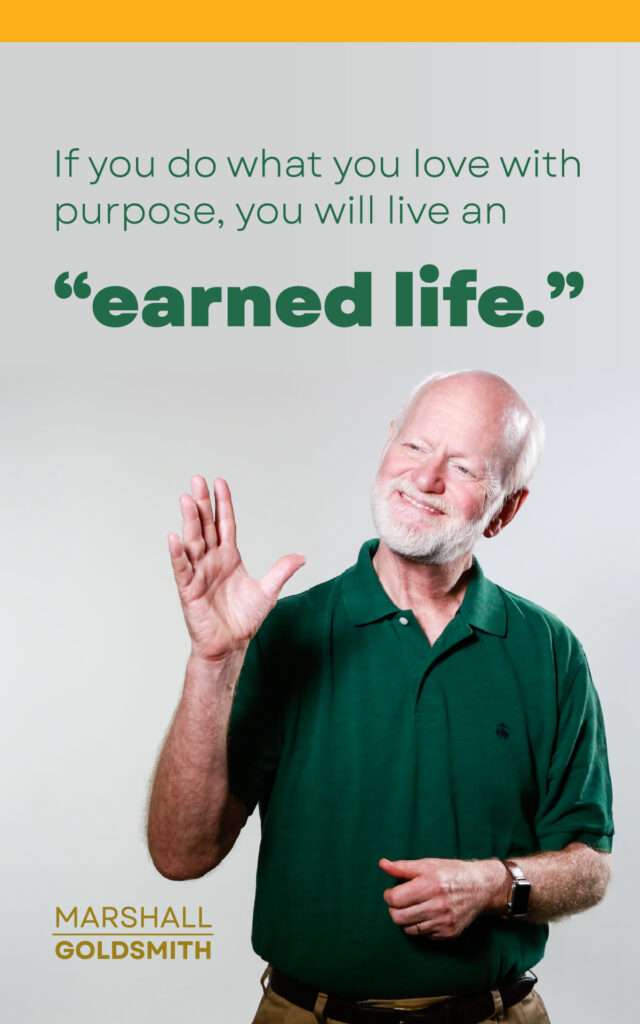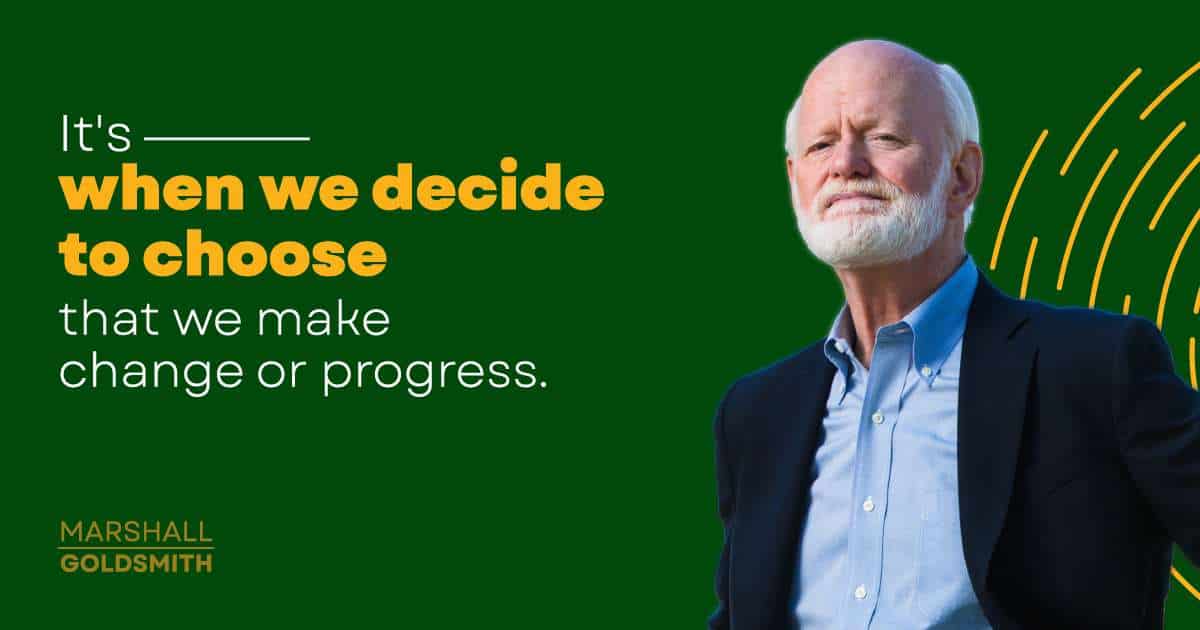Playing Favorites By Marshall Goldsmith There’s a reason I devote...
We easily make at least a hundred choices a day, without realizing we’re doing it. We choose what to wear, what to eat, the route to work (even if it’s the same route as always, it’s still a choice), when to take a break, what to read, what to watch, when to go to bed.
Most of our choices are not focused but ad hoc, that is, instant or unthinking, automatic — but choices still. It’s when we decide to choose that we make change or progress. I’ve heard a writer say to someone, who asked him where he found the time to write, “I chose to find time.” Sometimes if you don’t choose, you are in a way making a choice not to be productive or not to choose something as a priority.
I’ve always thought that the luckiest people on earth, at least in terms of career, are the ones who can honestly say, “I get paid to do for a living what I would gladly do for free.” Musician, video gamer, park ranger, fashion designer, food critic, professional poker player, dancer, personal shopper, member of the clergy. All of them excel at what they love and love what they excel at—and the world is willing to pay for it. Whether the payday is staggering or puny, they rarely regret the path they’ve chosen—because it was the only path they could see for themselves. In other words, they had no choice.
Not far behind these lucky few are the accomplished people who, when asked how they came to their current station in life, reply, “It was the only thing I was good at.” I’ve heard this line from advertising wizards and gardeners and software designers and journalists. They’re not so fortunate that they would do their jobs for free, but the ease they felt in choosing their career path is identical to what the video gamer or cleric felt. They believed they had no other choice.

Creating an earned life begins with a choice. It begins with sifting through all the ideas you harbor for your future (assuming you have ideas) and choosing to commit to one idea above all the others. This is easy to say and not so easy to do. Perhaps you are a restless creative type with an excess of ideas who cannot pinpoint the single idea you want to work on. Perhaps you have the opposite problem: You lack ideas and automatically default to inertia instead.
In such a tight spot, where do you begin? How do you make up your mind about the future, the sacrifices you’ll have to make, who you share it with, and where it happens? How can you be sure your eventual choice offers you the best chance for achieving fulfillment rather than suffering regret?
The conventional first step is to ask yourself a question such as, “What do I want to do next?” or “What would make me happier?” This is not the way to begin. First, you need to run through a few preliminary steps. Each step should help you narrow the many options to a single one where you have no choice.
Creating an earned life is first and foremost a matter of scale. Go big on important things that keep you on message, and small on things that don’t influence the outcome. This is the secret of living an earned life: It is lived at the extremes. You are maximizing what you need to do, minimizing what’s unnecessary.
I didn’t appreciate this until I was forty. In my 73rd year, I believe I’ve earned my life. I credit it to some soul-searching I did in 1989 when it became apparent that my career path was not heading toward the placid life of working for the weekend that I had imagined. My wife Lyda and I had two young children and a hefty mortgage. But I was, for the first time, contemplating working solo as a corporate trainer without the backup of an organization or partners. If I succeeded at it, I’d be traveling extensively and spending more time away from my family, which worried me. This led to my soul-searching.
So I asked myself: ‘Do I have the psychological and emotional resources to sustain myself and be happy? Was I willing to maximize these resources consistently over a long period of time, fighting off other priorities and distractions? Was I willing to pay the price to succeed at this new path?’
This wasn’t a test of my motivation, ability, understanding, or confidence. I could do the job. It was an appraisal of how much I would be sacrificing. I was establishing my priorities and confronting the trade-offs I was willing to accept. Could I find balance in what some people might regard as an insanely unbalanced life?
I listed the following:
• Achievement
• Engagement
• Happiness
• Meaning
• Purpose
• Relationships
I raced quickly through the non-worldly factors of purpose, engagement, achievement, meaning, and happiness. They were links in a familiar chain: Purpose meant I had a reason for what I’m doing, which ensured full engagement, which improved my odds of achieving my goal, thus adding meaning to my life as well as a fleeting sense of happiness. I didn’t doubt that my new gig would deliver all of these. Maximize one and the others will follow.
What remained was relationships, namely, my family. My concerning issue was the effect constant travel would have on my relationship with Lyda and our children.
The facts were: (a) This was my best idea for living my own life at the time, something that aligned with my training, my interests, and my desire to help people in a meaningful way; (b) It was gratifying that people wanted to hear what I had to say and I could make a living at it; and, most important, (c) Constant travel was a non-negotiable part of the job, no different than if I were a long-haul trucker or flight attendant.
I wasn’t torn between two choices. I had only one choice, which, as I’ve said, is really no choice. My only question was one of scale: What were the dimensions of my travel obligations? How many days on the road qualified as “maximizing,” and what would be the consequences of “minimizing” my presence at home?
If an earned life is one of productive overkill—of going all in on what matters—accompanied by sacrifice and trade-offs, that was the moment I got serious about earning my life. I had no other choice.
In my next blog, I’ll tell you how I solved this problem for myself.
And I’ll provide you with an exercise that can help you make such decisions on your own.

Adding Too Much Value Won’t Get You There By Marshall...
C-Suite Master Class: No, But, However By Marshall Goldsmith Continuing...
The Doerr Institute: Expanding the Market for Coaches By Marshall...
Making Leadership Development Part of the College Degree at Rice...
Sanyin Siang – Winner of the Thinkers50 Marshall Goldsmith Coaching...
Thinkers50 Marshall Goldsmith Distinguished Achievement Award in Coaching – Nominees...
Leading with Influence: What Is Influence360°? By Marshall Goldsmith Founder...
Are You a Dominator, Manipulator, Persuader or Influencer? By Marshall...
Leading with Influence: Redefining Modern Influence Part 2 By Marshall...
My mission is simple. I want to help successful people achieve positive, lasting change and behavior; for themselves, their people, and their teams. I want to help you make your life a little better. With four decades of experience helping top CEOs and executives overcome limiting beliefs and behaviors to achieve greater success, I don’t do this for fame and accolades. I do this because I love helping people!
As an executive educator and coach, I help people understand how our beliefs and the environments we operate in can trigger negative behaviors. Through simple and practical advice, I help people achieve and sustain positive behavioral change.